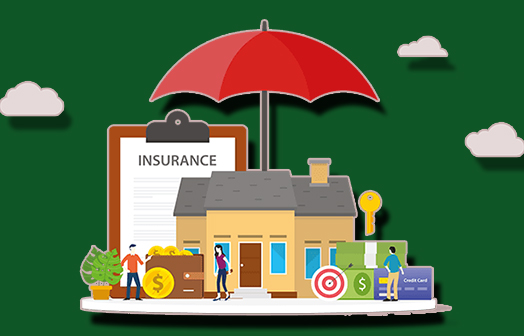Does Homeowners Insurance Cover Water Damage? – Water damage can be covered by homeowners insurance, but it depends on the cause of the damage. Some policies cover damage from a burst pipe if the incident is sudden and accidental. If live in an area prone to flooding, carefully go through what your insurance policy covers.

According to the Insurance Information Institute, water damage and freezing claims are 24% of all homes, while insurance claims and the average payout claim is about $12,514.
Varieties Of Water Damage Covered By Homeowners Insurance
Water damage is a major cause of homeowners’ insurance claims, and it can be costly and disruptive. Water damage accounts for about one in every five homeowner’s insurance claims. So, it is important to know what is covered
- Burst pipes: Homeowners insurance will usually cover this type of damage, as long as the frozen pipe burst was sudden and accidental,
- Accidental leaks: An accidental leak such as plumbing or an appliance leak, like broken washing machines, or dishwashers.
- Water damage: Homeowners cover water damage caused by sudden and accidental events, like a burst pipe, Heavy rain or hail or leaking appliance
- Ice dams: Homeowners cover for damages caused by iced dams, including damage to your roof, siding, and interior.
It is important to read your policies to know what their exclusions are.
Varieties Of Water Damage Not Covered by Homeowners Insurance
When it comes to homeowners insurance, one of the most important things to understand is what is and isn’t covered. Here are some common problems not covered
- Damage caused by negligence, such as not repairing your plumbing problem or failing to remove snow from your roof.
- Flood damage, such as hurricanes, tsunamis, storm surges, and water from overflowing rivers are not covered by a standard homeowners insurance policy
- Water damage from intentional acts, intentional acts of water damage, such as vandalism or arson, is typically not covered
- Water damage, such as sump pump failure, seepage of leaks through a foundation, sewer, or drain, leaks, and earth movement, are not covered by the policy
How Do I File An Insurance Claim For Water Damage?
To file a claim, taking pictures or videos of the area is good, and then contacting your insurance company as soon as possible. You will need to provide information on when the damage occurred, how it happened, and any estimates you’ve received for the repairs. Your homeowner’s insurance company will review your claims and determine whether it’s covered under your policy and may come for an inspection to estimate repairs.
How to prevent water damage
The best way to prevent water damage is to take some simple precautions which are:
- Inspect your home very regularly for signs of leaks or water damage
- Check your appliances to prevent water seepage
- Install a water alarm in your home
- Check pipes regularly for signs of cracks or tears
- Address any leaks or damages as soon as you find them
- Keep your gutters and downspouts clear of debris
- Locate your main water valve and shut it when a water damage problem arises
- Have your home inspected by professionals
- Shut down all water supplies before leaving home for vacation.
- Consider installing a backflow prevention device
- Check your roof for missing or damaged shingle
- Replace your hose faucets regularly
- Keep trees and shrubs away from your home foundation
By following these tips and incorporating them into your regular home maintenance routine, you can effectively prevent water damage and protect your home from potentially costly repairs.
Who pays for a water leak repair?
It’s the responsibility of homeowners to pay for water leak repair. However, there are some situations where the responsibility may fall on someone. For instance, if the leak is caused by plumbing issues in a neighboring property, the neighbors may be responsible for the repair. Generally speaking, it’s the homeowners who are responsible for water repair
How to get insurance to pay for water damage
When faced with water damage in your home, it’s essential to act swiftly and methodically to mitigate the impact. Here are key steps to guide you through the process:
- Determine the source of water
- Determine if the source of water is covered by homeowner insurance policy
- If it’s covered, then call your agent and report the claim
Taking these steps promptly can help expedite the restoration process and minimize the impact on your home.
Frequently asked questions
Does Homeowners Insurance Cover Flood Damage?
Most homeowner’s insurance policies do not cover flood damage, and you would need to purchase a different flood insurance to be covered
Does Homeowners’ Insurance Cover Mold Damage?
Most homeowners insurance policies will cover mold damage, but only if the mold was caused by a covered peril, like a burst pipe. Mold damage caused by poor maintenance or neglect is usually not covered
Does Homeowners Insurance Cover Damage From Burst Pipe
Most homeowners insurance policies cover for damages from burst pipes, as long as the burst was sudden and accidental. The policy covers the cost of repairing the pipe, as well as any damage to the home and belongings caused by the burst
Does the Homeowner Cover Water Damage caused by Sewer Backup?
This is usually not covered by a standard homeowner’s insurance policy. However, you may be able to purchase a separate sewer backup rider to add this coverage to your policy.
Does Homeowners Insurance Cover Water Damage Caused By a Hurricane or Tropical Storm?
Homeowner’s insurance policies do cover damages caused by hurricanes or tropical storms, but it depends on the specific policy and the details of the storms.

